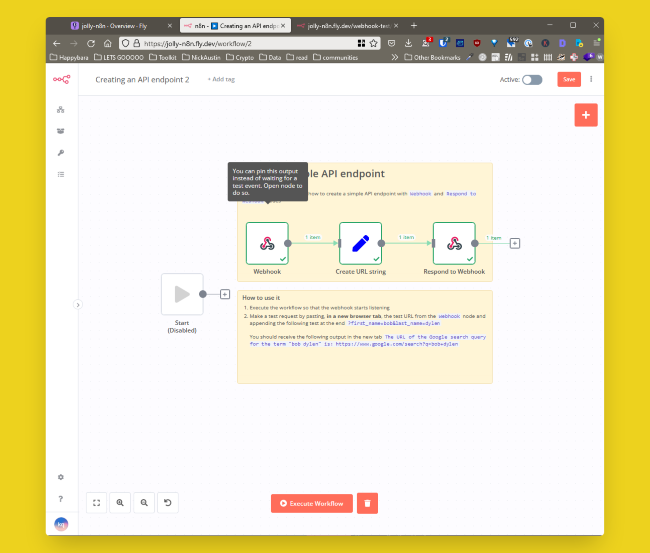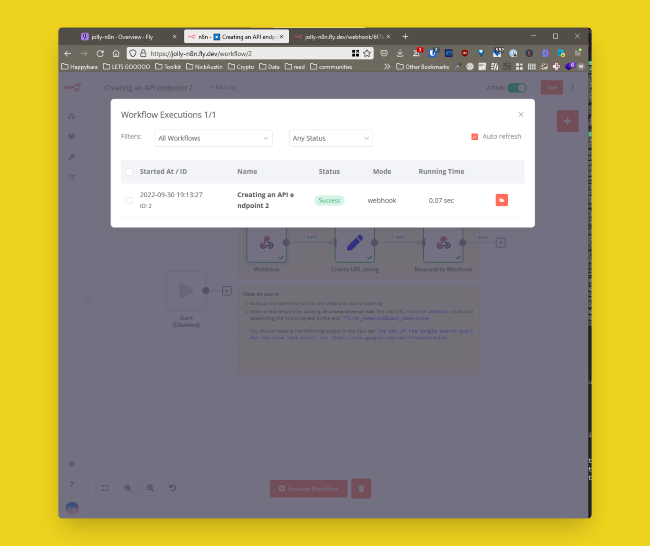How to Self-Host n8n on Fly.io
You want to self-host apps for fun or privacy - but not the ‘running servers in your garage’ type of self-hosted. In 2022 we live in a Golden Era of low-cost VPCs and hosting providers, and there has never been a better time for people looking to offload the frustrating parts of self-hosting, while still operating on a shoe-string budget.
In this guide we’ll be setting up your own instance of n8n , an alternative to Zapier. It will have minimum configuration options to get up and running with a SQLite backend, and should cost <$5/month (Unfortunately it needs too much memory to run in the fly.io free tier.) If you want Postgres or MySQL, n8n has more information in their generic Docker instructions for how to connect.
😢 SQLite??? Is that even production ready??
You’d be surprised how much traffic you can support with SQLite - NomadList & RemoteOK both run on it and pull in significant revenue ($millions) and handle tons of traffic. Read more in Consider SQLite and how Michael Lynch uses SQLite + Litestream to never worry about backups .

Time to get your self-hosted n8n off the ground so you can get back to procrastinating!
🛠️ Fly.io account setup
We need to take a quick detour to ensure you have an account with Fly.io .
Install the
flyctlCLI tool.Authenticate with
flyctl auth signup(for newbies), orflyctl auth login(existing accounts).⚠️ You will have to add credit card information to the account. It should cost < $5/month if you keep to the minimum server configuration settings. Supporting a team of people will of course have larger requirements.
🤸Deploying n8n to Fly.io
Now that you have an account & the CLI all set up - we can get to the real action!
Create a new directory & initialize the project with fly.toml 🔗︎
I chose jolly-n8n for my app name, so wherever you see that value, swap it out with your own.
mkdir fly-n8n/
cd fly-n8n
flyctl launch --image n8nio/n8n --no-deploy
Create the volume for persistent storage 🔗︎
ℹ️ I set this to volume of 1 GB since I am deploying multiple apps on Fly, but the free tier supports up to 3GB for your account .
flyctl volumes create nocodb_vol --size 1 -r ord
Increase the memory available for your instance 🔗︎
Unfortunately, n8n requires enough memory that if you try to run on the free tier of Fly, you end up hitting the memory limit:
💥[info] [ 24.178128] Out of memory: Killed process 528 (node) total-vm:10986500kB, anon-rss:194396kB, file-rss:0kB, shmem-rss:0kB, UID:1000 pgtables:5580kB oom_score_adj:0
For this guide, we’ll just bump it up a single level to keep testing as cheap as possible, but if you’re running it for any serious application, you’ll want to consider using a beefier server.
flyctl scale memory 512 -a "jolly-n8n"
Manually edit fly.toml: update the mounts to use the new volume
[mounts]
source="n8n_vol"
destination="/home/node/.n8n"
Manually edit fly.toml: update necessary environment variables 🔗︎
[env]
N8N_HOST = "jolly-n8n.fly.dev" # <your-app-name>.fly.dev
WEBHOOK_URL = "https://jolly-n8n.fly.dev" # https://<your-app-name>.fly.dev
TINI_SUBREAPER = "true"
N8N_DIAGNOSTICS_ENABLED = "false" # optional
N8N_HIRING_BANNER_ENABLED = "false" # optional
# Find yours https://momentjs.com/timezone/
GENERIC_TIMEZONE = "America/Chicago"
Why did we need to update these? 🔗︎
During initial deployment, I ran into a number of issues that you will hopefully avoid by updating these settings.
💥
TINI_SUBREAPER: clash between n8n process manager and Fly. Here is the error I saw, in case someone stumbles on it in the future:[WARN tini (523)] Tini is not running as PID 1 and isn't registered as a child subreaper. [info] Zombie processes will not be re-parented to Tini, so zombie reaping won't work. [info] To fix the problem, use the -s option or set the environment variable TINI_SUBREAPER to register Tini as a child subreaper, or run Tini as PID 1.Why is this happening? Fly owns PID 1, so variable needs to be set so Tini and Fly don’t conflict. This n8n forum discussion got me pointed in the right direction to understand the
Whybehind the error.Use whichever you like! The only limitation you’re going to run into is that Fly.io owns your init (sorry!); we have to be PID 1. There are a bunch of process managers that want to replace init, and those’ll be tricky to get to work in a Fly.io app. Fly
💥
WEBHOOK_URL: override default config. Internally, n8n builds theWEBHOOK_URLvariable from a number of other environment variables , but when it runs behind proxies like Caddy or Fly that address will be incorrect when displayed in the dashboard. Set it manually to avoid issues.
🚀 Deploy your new app 🔗︎
flyctl deploy
🌴n8n live on Fly.io
With almost no effort at all, I have a self-hosted n8n instance running!

Upgrade n8n 🔗︎
Your instance has been humming along successfully for a while, but now you want to pull in all the latest & greatest features that were added to n8n. How does one update their self-hosted app?
⚠ This approach has been successful on other self-hosted apps, but has not been explicitly tested with n8n. It should work, but YMMV.
- Navigate to the directory where your
fly.tomlis saved. - Run
flyctl deployjust like when we first created the app.- Each time we run
deploy, it should grab the most recently published version of the Docker image.
- Each time we run
Other quick options 🔗︎
Fly is not the only simple hosting provider out there - there’s a gluttony of choice, and you as the customer are winning! A few other options include:
Fin 🔗︎
I gotta hand it to the team at Fly, they’ve made it a very slick process for your first apps. Also shoutout to n8n for creating such a fantastic product and keeping it open-source so everyone can benefit from it. If you want to support them, check out their hosted n8n Cloud service and/or their community forum .
Questions? Concerns? Big hugs? Let me know what you’re thinking on Twitter .
See Also
- How to Self-Host Actual Budget on Fly.io
A simple guide to self-host an Actual server in just a few minutes, for free.
- How to Self-Host NocoDB on Fly.io
A simple guide to self-host a NocodDB Airtable alternative in just a few minutes, for free.
- Automate Recurring Venmo Payments with Github Actions and IFTTT
Let the nice robots at GitHub handle sending Venmo requests to your friends.
- Creating Pages from Data Programmatically for Hugo
Ways to programmatically generate pages from data for Hugo. Automate your page creation.
- Obsidian Plugins for the Casual User
Plugins to make Obsidian as comfortable as other note apps, aimed at those who want tools that don’t need tinkering.